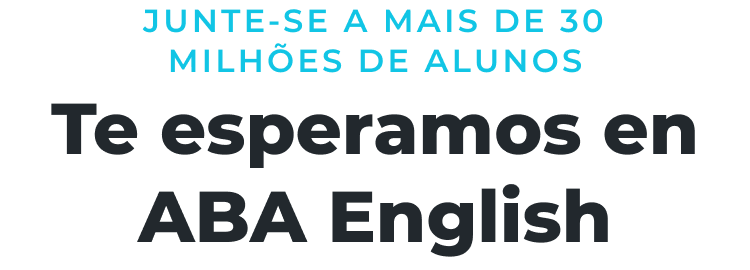Present continuous
O que é e quando usar o presente progressivo?
O presente contínuo é um dos quatro tempos verbais do presente em inglês e é usado para descrever ações que estão acontecendo enquanto falamos. Assim como no português, é formado com o presente do verbo to be e o gerúndio do verbo correspondente.
Estrutura do present continuous
Forma afirmativa
A estrutura deste tempo verbal no afirmativo é a seguinte:
Subject + to be + verb (-ing)
Exemplos:
- I am writing. (Estou escrevendo).
- We are dancing (Estamos dançando).
Forma negativa
Para formar o negativo, basta colocar a palavra not depois do verbo to be e antes do gerúndio. A estrutura seria:
Subject + to be + not + verb (-ing)
Exemplos:
- I am not writing. (Não estou escrevendo).
- We are not dancing (Não estamos dançando).
Lembre-se que a ordem é diferente em comparação com o português.
| Subject + to be + not | Abreviação |
| I am not | I’m not |
| He Is not She Is not It Is not | He’s not / He isn’t She’s not / She isn’t It’s not / It isn’t |
| You are not We are not They are not | You’re not / You aren’t We’re not / We aren’t They’re not / They aren’t |
Forma interrogativa
A forma interrogativa é formada com o verbo to be, o pronome e o verbo acabado em -ing. A estrutura seria:
To be + subject + verb (-ing)?
Exemplos:
- Are you reading? (Você está lendo?)
- Are we paying attention? (Nós estamos prestando atenção?)
| Estrutura | Exemplos |
| Am I + verbo com -ing ? | Am I working on Saturday? Am I working hard enough? |
| Is + (He / She / It) + verbo com -ing? | Is Maria having fun at the party? Is he reading the book I told him? |
| Are + (You / We / They) + verbo com -ing? | Are they playing soccer? Are you baking a cake for tonight? |
Forma contraída
No presente progressivo, o verbo to be é geralmente contraído, portanto, podemos utilizar as formas I’m, you’re, he’s, she’s, we’re, you’re e they’re.
+30 MILHÕES DE ALUNOS
Junte-se à escola digital de inglês
mais grande do mundo e aprenda inglês
Orações de exemplos do present continuous
Orações afirmativas
- I am starving. (Estou faminto.)
- He is doing all the work by himself. (Ele está fazendo todo o trabalho sozinho.)
- My mum is cooking rice. (Minha mãe está cozinhando arroz.)
- They are sitting in the sofa. (Eles estão sentando no sofá.)
- You are playing tennis. (Você está jogando tênis.)
Orações negativas
- They are not taking german classes anymore. (Eles não estão mais fazendo aulas de alemão.)
- We are not selling t-shirts anymore. (Eles não estão mais vendendo camisetas.)
- Maria and Carlos are not studying enough for their final exams. (Maria e Carlos não estão estudando o suficiente para suas provas finais.)
- She’s not visiting her friends this summer. (Ela não está visitando seus amigos este verão.)
- My children are not playing in that park, it’s not safe. (Meus filhos não estão brincando naquele parque, não é seguro.)
Orações interrogativas
- Are you having a hard time with this test? (Você está tendo dificuldade com este teste?).
- Is Jane moving out tomorrow? (A Jane vai se mudar amanhã?).
- Are you learning japanese? (Você está aprendendo japonês?).
- Are we watching a horror movie? (Estamos assistindo um filme de terror?)
- Are they sleeping at Ginny’s house? (Eles estão dormindo na casa da Ginny?)
Já conhece seu
nível de inglês?
Comece o teste
Cadastre-se em nossa página e acesse o teste de nível gratuito. Em poucos minutos você conhecerá seu nível e poderá continuar progredindo no curso.

Exercícios do presente contínuo
Exercício de present continuous no afirmativo
A/ Preencha os espaços em branco com o verbo entre parênteses no presente progressivo afirmativo
- Eu estou trabalhando? I ______________? (work)
- Ele está dizendo algo para ela: He ___________ her something. (tell)
- Minha irmã está cozinhando uma refeição para mim: My sister ____________ a meal for me. (cook)
- Você está descendo as escadas: You ______________ the stairs. (come down)
- Os Smiths estão sendo roubados: The Smiths ___________ robbed. (be)
- Estamos limpando a casa: We _________ the house (clean)
Respostas: am working; is telling; is cooking; are coming down; are being; are cleaning.
Exercício de presente contínuo no negativo
A/ Preencha os espaços em branco com o verbo entre parênteses no present continuous negative
- Você não está me ouvindo?: ___ you ________ to me? (listen)
- Ela não está assistindo TV em seu quarto. (watch)
- Eles não estão esperando por você: They ______________ for you. (wait)
- As crianças não estão jogando esportes agora: Kids ___________ sports now. (play)
- Minha irmã não está cozinhando uma refeição para mim: My sister ____________ any meal for me. (cook)
Respostas: Are you not listening; is not watching; are not waiting; are not playing; is not cooking.
B/ Organize as seguintes palavras para formar frases com o present continuous negative.
- isn’t / the cat / meowing. ___________________
- studying / geography test / they are not / for the. ______________________
- not asking / we are / for you. ______________________
- pancakes / I’m / for breakfast / not eating. ________________________________
- not forming / they are / a new music group. ________________________________
- sleepy / isn’t / today / she. _____________________
- eating / we / food / not / fast / are _____________________
Respostas:
- The cat isn’t meowing.
- They are not studying for the geography test.
- We are not asking for you.
- I’m not eating pancakes for breakfast.
- They are not forming a new music group.
- She isn’t sleepy today.
- We are not eating fast food.
Exercícios do presente contínuo interrogativo
A/ Complete as seguintes frases com o sujeito e verbo que estão entre parênteses:
- Sarah está fazendo amigos na sua nova escola?: ________ friends at the new school? (Sarah / make)
- Você está cozinhando o jantar?: Are you ______ dinner? (cook)
- Mary e John estão indo para a escola?: __________ to school? (Mary & John / go)
- Eles estão fazendo aulas de karatê?: _________ karate lessons? (they / take)
- Ela está lendo uma novela legal?: __________ a nice novel? (she / read)
Respostas: making, cooking, going, taking, reading
B/ Organize as seguintes palavras para formar perguntas com o present continuous interrogative.
- The boy / football / playing / is / ? _________________________
- Waiting / are / for her / Maria’s parents / ?_________________________
- I told you / watching / he / TV show / I / ? _________________________
- Holidays / are / going on / they / ? __________________________
- Family / with him / staying / is / his / ? __________________________
- They / what / are / doing / ? __________________________
Respostas: Is the boy playing football?, Are Maria’s parents waiting for her?, Is he watching that TV show I told you?, Are they going on holidays?, Is his family staying with him?, What are they doing?
Links úteis


























